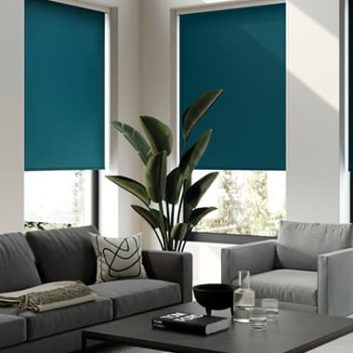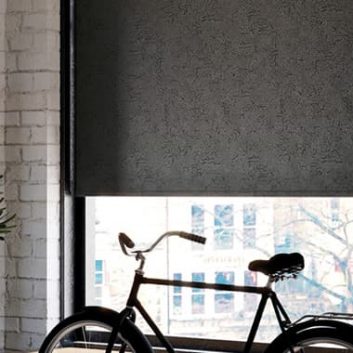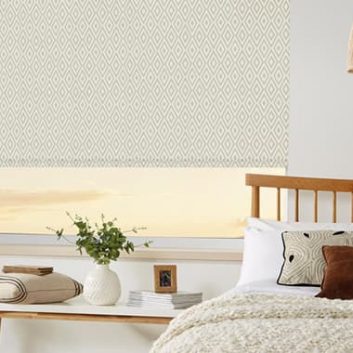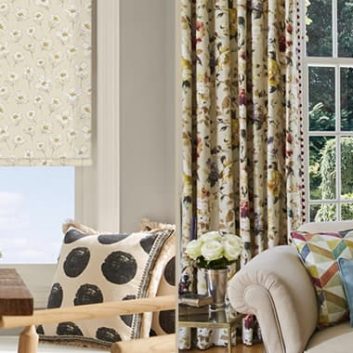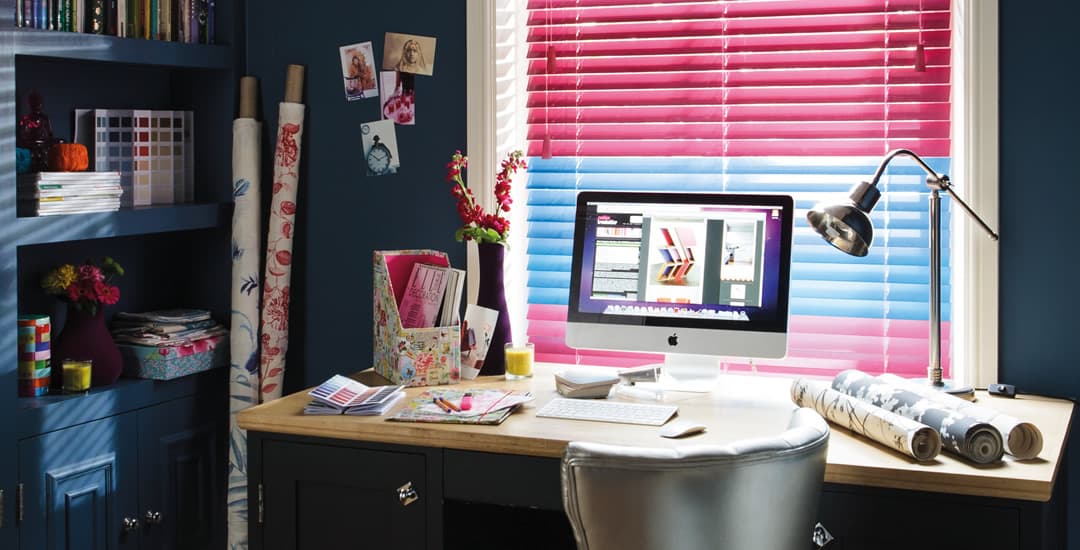
If you are realistically expecting home working and keeping your spare room/box room/dining room table as your workplace for the foreseeable future – now might be the time to gussy it up a bit to make it both more conducive to work and also more pleasant to be in.
Investing in home office window blinds might be fairly high on your list of priorities here, particularly if you’re having issues with screen glare, or found yourself sitting in a draft from the window all winter long.
There is even a possibility that you might be able to get your employer to stump up for functional enhancements to a home working space like office blinds, price notwithstanding of course; although whether or not you’ll get anywhere when you pitch this to the holder of the petty cash purse strings, I could not possibly comment.
In this blog post I’m going to talk about what to consider when choosing blinds for a home office to make sure you make a sound pick on what to spend your (or ideally, your employer’s) cash on, and that you don’t miss anything important.
Check out my other blog post if you’re looking for direct suggestions of the best blinds for home office windows.
Allowing enough light into the room without making it blinding
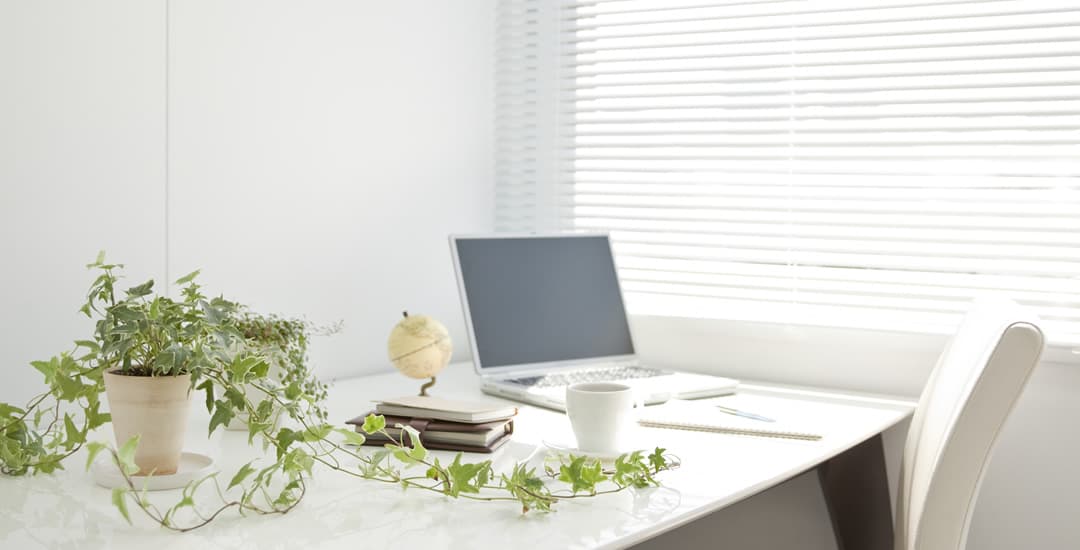
Blinding! See what I did there? Ok moving on. One of the things that dictates the best blinds for a home office is the level of light control you need, which I have banged on about at some length already within a previous blog post.
Getting as much natural light as possible is good for your health as well as your productivity, and so home office window coverings should be fairly discreet when fully opened so that the material of your blind itself doesn’t continue to occlude half the window even when fully open. This latter tends to happen the most with Roman blinds, which are really more about looking beautiful and distinctive than concerning themselves with getting out of your way when not in service.
Maximising the natural light you do get is of particular importance if your home office windows are small or otherwise don’t see a lot of sun.
On the flipside of this though, if your home office is one of the brightest rooms of the house, this is not always a good thing either. Blinds for home offices that are superbright can serve to mute this effect to an extent, and this can be achieved with say, roller blinds made of what we in the trade call “dim-out fabrics,” which take the edge off bright sunlight without blocking it entirely.
Preventing glare and filtering the light
One of the great ironies of I dunno, home working, computing, or the actual sun itself is that sometimes even a room that feels dingy will also allow for a high level of screen glare, making working when the sun hits your computer a certain way difficult and also potentially headache-inducing.
If you find that you spend an hour or two a day fighting screen glare and are starting to think that “squinting” is just what your face looks like now, you’ll want the office blinds you pick to offer a fine degree of control to filter light, such as by using tilting slats or louvres. Vertical, Venetian, wood, or faux-wood blinds are the lads you want in your window here.
Making you not look like a Gremlin on Zoom
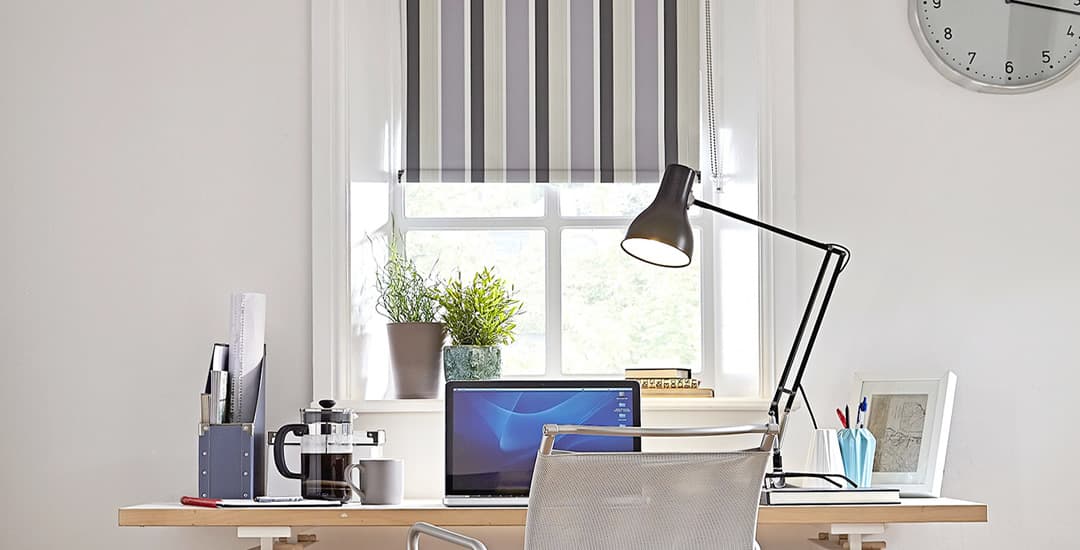
If the lighting in your home office does something (and not a good something) weird to your skin tone or general appearance when you’re on Zoom, or if the placement of your window and how it catches the sun turns your face into a dark void that also cannot see the screen, the natural light is probably too bright or coming at you from the wrong angle.
In this sort of situation, your best bet is to get a blackout blind and negate the issue entirely, and then use artificial lighting that can be angled and brightened or dimmed as needed instead to make you look ten years younger ensure you look presentable enough for video conferences.
Blocking drafts and helping to insulate the room
As I covered in my other blog post about the importance of getting the lighting right in your home office, all too often the reason why a room (or area) of the home is free to be pressed into use as a home office at all is because nobody wanted it for something else; which is usually because something (even something subtle) was wrong with it.
Chilly home offices will ruin your life, as will a little fan heater under your desk; not only will this latter cause your heating bills to require regular choices between “eating” and “not freezing” for several months of the year, but they’re also likely to leave you with a dry throat and dry eyes too.
I’m not saying that home office blinds are going to magically stop a Baltic room from feeling like the fridge, but if you choose thermally efficient blackout blinds, these can really help to insulate the room and block drafts, and can actually lower your heating bills as well.
Not offending your stylistic sensibilities
Finally, anyone who ever bought a house with an avocado bathroom suite will be well aware that there’s a lot to be said for a room not making you blanche every time you go in there.
For a home office where you will spend a big chunk of your day and where you need to be productive, this is even more important.
Modern office blinds for sale in the UK come in such a wide range of fabrics, styles, and materials that you’ll be able to find something to suit any design aesthetic, whether that’s minimalist, “CEO of a Fortune 500” (dream big, you little IT wizard) or “it’s my home office and my blinds can and will have superheroes on them if I want them to, so there.”

